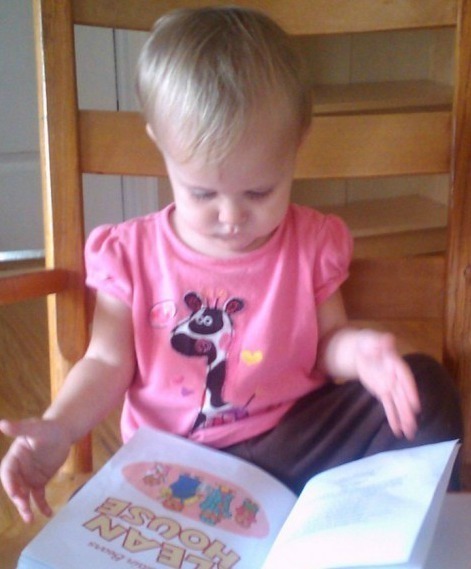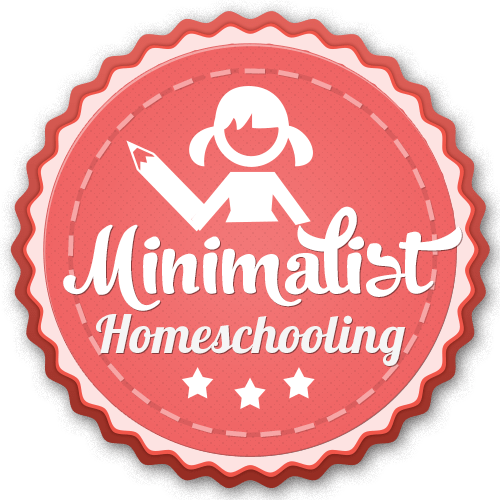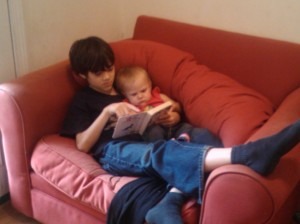This is a post in a series of 31 Days of Minimalist Homeschooling. See the intro post with all the topics here.
Personally, I feel that we over-complicate the process of teaching a child how to read. In fact, I would argue that one learns how to read, regardless of being “taught”. Right now I’m reading To Kill a Mockingbird, and I chuckled at this passage:
“Now that I was compelled to think about it, reading was something that just came to me… I could not remember when the lines above Atticus’s moving finger separated into words, but I had stared at them all the evenings of my memory… anything Atticus happened to be reading when I crawled into his lap every night.”
Scout was criticized by her teacher, who insisted that her father stop reading to her, lest he ruin her ability to learn to read. Ha! Thankfully, Atticus didn’t go along with the teacher’s ideas.
“About reading, children learn something much more difficult than reading without instruction – namely, to speak and understand their native language. I do not think they would or could learn it if they were instructed. I think reading instruction is the enemy of reading. ” – John Holt, educator and considered by many to the the father of the unschooling movement
Here are the simplest ways to teach a child to read without stressing about it.
Minimalist method of teaching kids to read

Be a reader yourself
Children naturally want to copy adult behavior. If your kids see you often with your nose in a book, they will probably begin to wonder what is so interesting about this activity.
Read aloud. A lot.
Read to your kids early and often. And not in order to “teach your child how to read”. Read to your child because you enjoy it, they enjoy it, and it’s fun.
Don’t worry
Don’t stress about a right or wrong way of reading to your child. If your preschool-age child isn’t interested in books yet, or won’t sit still for more than 30 seconds to finish a story, don’t fret. If your 3 year old wants to point at pictures or turn to favorite pages and ask a million questions, don’t fuss.
Children learn in different ways than adults do and I don’t think anyone knows enough about the human mind to figure it all out. Make reading together pleasant, not stressful.
Relax About Reading
Relax about how old your child is when they learn to read. Whether a child learns to read at 3 or at 8, studies show that it makes little difference in their intelligence or ability by the time they reach middle school.
Today I shared with a friend over lunch that Julien, my second son, was 8 when he learned to read (as was his older brother). The early part of his journey learning how to read was stressful for us both, mostly because I made it so.
Reading exhausted him. I was scared that he might not learn to read well, worried that he would always struggle with reading. I feared that he was a “shut down learner“. I worried that he wouldn’t grow up to be a bookworm (... like me).
Then one day, I decided to just stop.
I stopped worrying. I stopped making him read to me. I stopped reading to him.
(Gasp!)
I just decided to trust.
And so we had fun. We went to the pool. We played outside. We enjoyed each other’s company.
And slowly but surely (all of a sudden), he learned how to read.
Then, when he began public school, he complained about how slowly the other kids in his class read.
Reading is about deciphering code. Those little symbols on the page? They mean something. They have a sound.
All of a sudden, they just get it.
It just makes sense.
Kids learn how to read when they’re ready. Just as they are birthed when they’re ready. And they crawl when they are ready. And walk when they’re ready. And sleep through the night when they’re ready. And wean when they’re ready.
Kids teach themselves to read.
We just get the heck out of the way.
John Holt, the legendary educator and author, has been quoted as saying:
“It’s nice to have children’s books, but far too many of them have too much in the way of pictures. When children see books, as they do in the family where the adults read, with pages and pages and pages of print, it becomes pretty clear that if you’re going to find out what’s in those books, you’re going to have to read from that print. I don’t think there’s any way to make reading interesting to children in a family in which it isn’t interesting to adults.”


This sounds great and all, but what about those kids who just don’t?
I read. (Too much, honestly.)
I read aloud. Hours and hours, days and years.
I (try) not to worry.
My 12.5 year old daughter is still not reading.
This year we’ve signed her up for educational therapy. Because at some point you have to do something. (Actually, I’ve tried many somethings.)
Because when an otherwise intelligent almost-teen is not reading, THERE IS A PROBLEM. Something is making this more difficult than it “should” be.
Reading is not a natural activity. Even if it was, there are times when intervention is necessary to prevent death during birth. First aid maneuvers prevent choking during eating (on those rare occasions when it is necessary.) Many children may learn to read on their own, but for those that may not, I don’t want to condemn them to a life of illiteracy waiting for them to “just get it”.